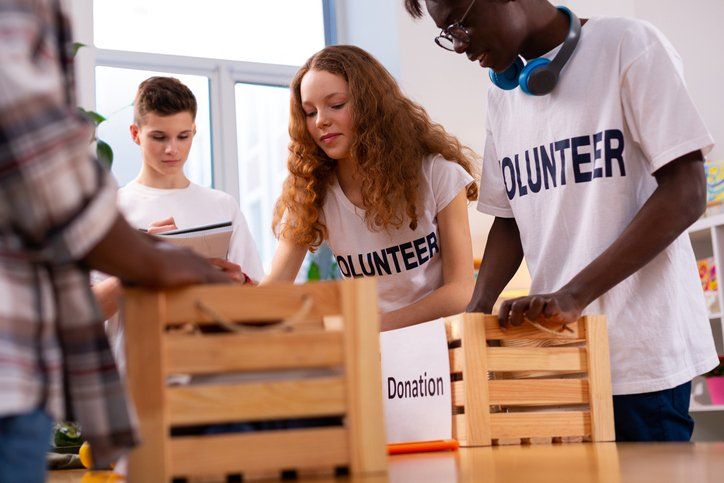This page is licensed under Creative Commons under Attribution 4.0 International. Anyone can share content from this page, with attribution and link to College MatchPoint requested.
Building on a Student’s Connection with the Common Good
Schools want to see that your student is connected with the common good. The words used to describe this concept are different across different schools—everything from "generosity toward others" to "collaborative and cooperative spirit"—but the idea is always the same: it's the societal impact of the communities a student is involved in.

Due to the pandemic and other forces, nearly 80% of colleges have abandoned the SAT and ACT—some temporarily, some permanently. Because of this, engagement with surrounding communities has become an even stronger part of colleges' holistic assessment of students. A survey by the National Association for College Admission Counseling (NACAC) noted that competitive colleges "have many applicants with similarly high grades and test scores, and therefore tend to consider a broader range of factors, including positive character traits and a commitment to improving their communities."
Schools want to see that your student is connected with the common good. The words used to describe this concept are different across different schools—everything from "generosity toward others" to "collaborative and cooperative spirit"—but the idea is always the same: it's the societal impact of the communities a student is involved in. This can include their extended family, their neighborhood, and their communities at school. But it can also include connections in the broader community, including faith communities, civic organizations, and more formal governmental organizations. A student’s involvement in these communities often changes over the course of their high school life, and showing that kind growth and development is an important part of the application process.
But of course, it's not just about the application—it's about supporting our communities. Since 2013, Making Caring Common at Harvard University’s School of Education has studied students' commitment to the common good, sharing stories of high school students strengthening our democracy, mending the fractures that divide us, and creating a more caring, just world. Their research points to students drawing on their family’s values and their own personal attributes—including resilience, service, curiosity, perseverance, respect, kindness, and integrity—and shows just how valuable teens' involvement can be.
While this commitment to the common good is all about helping others, finding an opportunity that's interesting and exciting for your student can make service a win for all involved. Here are some questions your student can ask themselves:
What do you want to learn? This can include specific skills, like teaching or public relations, or more general ideas like “learn more about animals.” Start with two or three items.- In what areas do you want to grow? Maybe you want to gain exposure to issues and experiences that will broaden your perspective, or maybe there's a skill you want to develop, like becoming more comfortable meeting new people.
- What are you curious about? The focus here is the big questions you have about how the world and society work. Think: how can we help prevent rhinos from becoming extinct? Or what can we do to protect our democracy?
- What kinds of experiences do you most enjoy? Think about whether you prefer working one-on-one or in groups, outside or inside, with thoughts and conversation or hands-on activities.
- What level of impact do you want to make? This is related to the previous question. If you most enjoy working one-on-one, you may want to have a more personal impact; if you prefer large groups, you may look to have an impact on a larger scale. This is often the area of the greatest mismatch between volunteers and organizations, so it's helpful to spend a bit of time thinking about it.
Colleges that have made a commitment to the common good indicate that they look for signs of this commitment in a student's personal statement, teacher recommendations, the application form (with questions about service activities), and the college counselor report. Some students might also demonstrate this commitment in the additional information section of their application.


